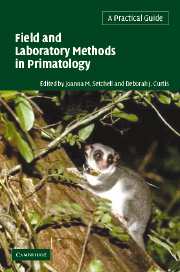Crossref Citations
This Book has been
cited by the following publications. This list is generated based on data provided by Crossref.
Muzaffar, Sabir Bin
Islam, M. Anwarul
Feeroz, Mostafa M.
Kabir, Mofizul
Begum, Sajeda
Mahmud, M. Shahriar
Chakma, Suprio
and
Hasan, M. Kamrul
2007.
Habitat Characteristics of the Endangered Hoolock Gibbons of Bangladesh: The Role of Plant Species Richness.
Biotropica,
Vol. 39,
Issue. 4,
p.
539.
Vinyard, Christopher J.
Yamashita, Nayuta
and
Tan, Chia
2008.
Linking Laboratory and Field Approaches in Studying the Evolutionary Physiology of Biting in Bamboo Lemurs.
International Journal of Primatology,
Vol. 29,
Issue. 6,
p.
1421.
Strier, Karen B.
2010.
A Companion to Biological Anthropology.
p.
243.
Taffoni, Fabrizio
Vespignani, Massimo
Formica, Domenico
Cavallo, Giuseppe
Di Sorrentino, Eugenia Polizzi
Sabbatini, Gloria
Truppa, Valentina
Mirolli, Marco
Baldassarre, Gianluca
Visalberghi, Elisabetta
Keller, Flavio
and
Guglielmelli, Eugenio
2012.
A mechatronic platform for behavioral analysis on nonhuman primates.
Journal of Integrative Neuroscience,
Vol. 11,
Issue. 01,
p.
87.
Holguin-Medina, Victoria Eugenia
Fontenele-Araujo, John
Alcaraz-Romero, Víctor Manuel
Cortes, Jose Francisco
and
Muñoz-Delgado, Jairo
2015.
Circadian and ultradian activity rhythms in manatee (Trichechus manatus manatus) in captivity.
Biological Rhythm Research,
Vol. 46,
Issue. 5,
p.
631.
2015.
Primate Research,
Vol. 31,
Issue. 1,
p.
75.
McKinney, Tracie
2017.
Ethnoprimatology.
p.
9.
Galán-Acedo, Carmen
Arroyo-Rodríguez, Víctor
Estrada, Alejandro
and
Ramos-Fernández, Gabriel
2019.
Forest cover and matrix functionality drive the abundance and reproductive success of an endangered primate in two fragmented rainforests.
Landscape Ecology,
Vol. 34,
Issue. 1,
p.
147.
Korzeniowska, Dominika
and
Sułkowski, Łukasz
2020.
Experimental and Quantitative Methods in Contemporary Economics.
p.
71.
Maldonado, Angela M.
Soto-Calderón, Iván D.
Hinek, Andrea
Moreno-Sierra, Alejandra M.
Lafon, Thomas
Londoño, Daniela
Peralta-Aguilar, Ana
Inga-Díaz, Giancarlo
Sánchez, Nofre
and
Mendoza, Patricia
2023.
Owl Monkeys.
p.
623.



